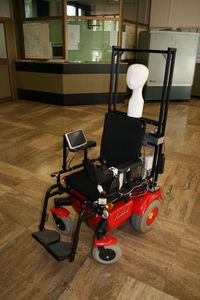LURCH - The autonomous wheelchair
LURCH - the autonomous wheelchair
| |
| Short Description: | Augmenting commercial electric wheelchairs with autonomous navigation, obstacle avoidance, and multi-modal interfaces |
| Coordinator: | MatteoMatteucci (matteo.matteucci@polimi.it) |
| Tutor: | SimoneCeriani (ceriani@elet.polimi.it) |
| Collaborator: | GiulioFontana (giulio.fontana@polimi.it), AndreaBonarini (andrea.bonarini@polimi.it) |
| Students: | DiegoConsolaro (diego.consolaro@mail.polimi.it), LucaCalabrese (luca.calabrese@mail.polimi.it) |
| Research Area: | Robotics |
| Research Topic: | Robot development |
| Start: | 2007/02/01 |
| End: | 2015/12/31 |
| Status: | Closed |
L.U.R.C.H. is the acronym of "Let Unleashed Robots Crawl the House" and beside the intentional reminder to the Addam's family character it is the autonomous wheelchair developed at the AIRLab. Its name for "official" settings is RBWC (RoBy WheelChair).
LURCH is an extended version of an commercial electric wheelchair (Rabbit by OttoBock) equipped with:
- An interface circuit for digital drive via a radio serial link (XBee modules)
- Two on-board computers (PCBricks), powered by wheelchair batteries
- A 7-inch touchscreen monitor (Xenarc 700TSV), 800x480 resolution (16:10 AR)
- Two laser scanners Hokuyo URG 04LX
- A colour camera FireI400 (resolution 640×480)
- An odometry system based on encoders applied to the rear wheels
Main goals of the LURCH project are:
- Add sensors and robotic functionalities to the powered wheelchair.
- Add various command interfaces, such as Joypad wireless, speech command, facial muscle control, brain-computer interface.
- Semi-autonomous navigation with collision and obstacle avoidance.
- Autonomous navigation by path planning and localization.
Functions currently provided by LURCH:
- Driving by the original joystick or a Logitech RumblePad2 wireless joypad.
- Obstacle sensing using planar scanner lasers.
- Basic collision and obstacle avoidance behaviours.
- Indoor localization by a fiducial marker system
- Path planning and basic autonomous navigation.
- Brain-computer interface driving system
NOTE: AIRWiki users can find operative information to use the Lurch robot in the Discussion tab associated to this page.
Media Coverage
Lurch project appeared in many national and international media. You can see the related articles and videos in the MediaCoverage page.
LURCH YouTube Videos
Restyling
Lurch has been restyled in June 2010, see here the upgrades...
New Board for Joystick Hack!
Diego Consolaro during his thesis time has written a paper (in Italian) to assembly the new modular board that he has developed.
Also during the thesis,many kind of joystick of commercial wheelchair were analyzed; the results of this analysis are summarized in his thesis (in Italian).
In the user manual (in Italian) is written the commands for the normal use of the board system.
Laboratory work and risk analysis
Laboratory work for this project is mainly performed at AIRLab/Lambrate. It includes some mechanical work and electrical and electronic activity. Potentially risky activities are the following:
- Use of mechanical tools. Standard safety measures described in Safety norms will be followed.
- Use of soldering iron. Standard safety measures described in Safety norms will be followed.
- Transportation of heavy loads (e.g. robots). Standard safety measures described in Safety norms will be followed.
- Robot testing. Standard safety measures described in Safety norms will be followed.
